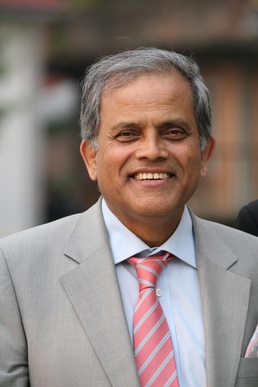Upendra Devkota
Upendra Devkota (Nepali: उपेन्द्र देवकोटा) was a prominent Nepalese neurosurgeon, recognized for his significant contributions to neurosurgery in Nepal. Born in Gorkha District, Nepal, Devkota's work has left a lasting impact on the medical field in the country, particularly in the development and advancement of neurosurgical techniques and infrastructure.
Early Life and Education[edit | edit source]
Upendra Devkota was born in a remote village in the Gorkha District of Nepal. From a young age, he showed a keen interest in the sciences and was determined to pursue a career in medicine. After completing his early education in Nepal, he went abroad to further his studies in medicine. Devkota received his medical degree and later specialized in neurosurgery, a field that was in its nascent stages in Nepal at the time.
Career[edit | edit source]
Upon returning to Nepal, Dr. Devkota joined the Bir Hospital, the oldest and one of the most prestigious hospitals in the country. Recognizing the dire need for specialized neurosurgical services in Nepal, he was instrumental in establishing the first neurosurgery department in the country. His efforts were not limited to clinical services; he also focused on training and mentoring the next generation of neurosurgeons in Nepal.
Dr. Devkota's dedication to his profession and his patients was evident in his work. He was known for his surgical skills, particularly in complex neurosurgical procedures, and for his compassionate approach to patient care. His contributions extended beyond the operating room; he was actively involved in advocating for better healthcare policies and infrastructure in Nepal, especially in the field of neurosurgery.
Legacy[edit | edit source]
Dr. Upendra Devkota's legacy in the field of neurosurgery in Nepal is unparalleled. He founded the National Institute of Neurological and Allied Sciences, a state-of-the-art facility dedicated to providing comprehensive neurosurgical and neurological care. This institute has played a crucial role in elevating the standard of neurosurgical care in Nepal and has become a center for learning and research in the field.
Death[edit | edit source]
Dr. Upendra Devkota passed away after a battle with bile duct cancer in 2018. His death was a significant loss to the medical community in Nepal and beyond. Tributes poured in from across the country and the world, recognizing his contributions to medicine and his role in improving healthcare in Nepal.
Conclusion[edit | edit source]
Dr. Upendra Devkota's life and work have had a profound impact on the field of neurosurgery in Nepal. His vision, dedication, and compassion have not only saved countless lives but have also inspired a new generation of medical professionals in the country. His legacy continues to influence the field of neurosurgery and healthcare in Nepal.
Search WikiMD
Ad.Tired of being Overweight? Try W8MD's physician weight loss program.
Semaglutide (Ozempic / Wegovy and Tirzepatide (Mounjaro / Zepbound) available.
Advertise on WikiMD
|
WikiMD's Wellness Encyclopedia |
| Let Food Be Thy Medicine Medicine Thy Food - Hippocrates |
Translate this page: - East Asian
中文,
日本,
한국어,
South Asian
हिन्दी,
தமிழ்,
తెలుగు,
Urdu,
ಕನ್ನಡ,
Southeast Asian
Indonesian,
Vietnamese,
Thai,
မြန်မာဘာသာ,
বাংলা
European
español,
Deutsch,
français,
Greek,
português do Brasil,
polski,
română,
русский,
Nederlands,
norsk,
svenska,
suomi,
Italian
Middle Eastern & African
عربى,
Turkish,
Persian,
Hebrew,
Afrikaans,
isiZulu,
Kiswahili,
Other
Bulgarian,
Hungarian,
Czech,
Swedish,
മലയാളം,
मराठी,
ਪੰਜਾਬੀ,
ગુજરાતી,
Portuguese,
Ukrainian
Medical Disclaimer: WikiMD is not a substitute for professional medical advice. The information on WikiMD is provided as an information resource only, may be incorrect, outdated or misleading, and is not to be used or relied on for any diagnostic or treatment purposes. Please consult your health care provider before making any healthcare decisions or for guidance about a specific medical condition. WikiMD expressly disclaims responsibility, and shall have no liability, for any damages, loss, injury, or liability whatsoever suffered as a result of your reliance on the information contained in this site. By visiting this site you agree to the foregoing terms and conditions, which may from time to time be changed or supplemented by WikiMD. If you do not agree to the foregoing terms and conditions, you should not enter or use this site. See full disclaimer.
Credits:Most images are courtesy of Wikimedia commons, and templates Wikipedia, licensed under CC BY SA or similar.
Contributors: Prab R. Tumpati, MD

